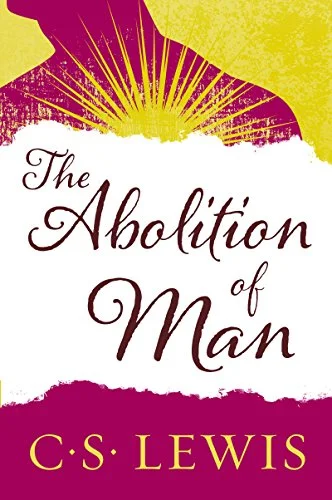| Title | The Abolition of Man |
| Author | C. S. Lewis |
| Publisher | HarperOne |
| Year | 2015 |
| Pages | 128 |
| Rating | ★★★★★ (5 stars) |
| Purchase Link | Buy Here |
The book The Abolition of Man is undoubtedly one of his most profound works. In this review, you will know everything about the book. To read more C. S. Lewis’ book summaries, click here.
Who is the author of The Abolition of Man?
This book’s author is very famous, and you probably heard about him.
The author of the book is CS Lewis, a famous theologian, author and university professor. He is the author of The Chronicles of Narnia and several famous books on the Christian faith.
He was always famous, but he became even more well-known when the Chronicles of Narnia got a movie adaptation. You can buy The Abolition of Man clicking here.
What is the synopsis of The Abolition of Man?
I’ll do a brief synopsis so you know the main book arguments.
The book talks about the existence of universal moral values, which are present in all men. Thus, he alerts to the dangers of thinking that values are subjective and the damage they can bring to society.
It’s a very philosophical book, and it’s very valuable if you want to deepen your knowledge about Lewis.
What is the summary of The Abolition of Man?
Although it’s a brief book, it’s very profound and I think it’s difficult to summarize it. But I’ll try to explain the book in one paragraph:
Lewis’ brief work is a defense of the existence of objective and universal values, such as love, charity and giving. In addition, the work shows the losses of a society without these values, arguing how it ends up harming society. CS Lewis criticizes the main relativist thoughts of his time, such as the supposed lack of objective truth.
Thus, the short and profound work shows the need for objective values that encourage man to be his best, instead of losing humanity.
Finally, the book’s message is that man should not succumb to the relativist thinking present in today’s society. Read a summary about “On Stories” by C. S. Lewis here.
What are the main points of The Abolition of Man?
The main lessons of the book are:
1. Relativism is invading our lives
Relativism is very present in our lives, and it’s increasingly entering all domains.
At the beginning of the book, Lewis criticizes a minor book by claiming that its authors reduce all value statements to pure sentimentality, giving students the message that all emotive expressions are useless.
Furthermore, he criticizes another author who rejects all types of anthropomorphism (when an animal or object acquires human characteristics), without distinguishing its good or bad use.
Both views deprive their students of the richness and variety of the language.
Thus, these authors were misguided, being excessively afraid of sentimentality.
Thus, Lewis believes, this is why modern educators no longer believe in objective value. That is: they don’t believe that objects like a beautiful waterfall are intrinsically good.
Thus, any expression of a human response is considered to be a statement merely about the speaker’s psychology and not a statement of deserved objective value.
2. Natural law (Tao) exists
Lewis cites a number of traditions: Aristotelian, Platonic, Hindu, Christian, and Taoist. According to him, all have a common natural law, which he calls Tao.
The tao is a repository of beliefs in which objective value is held. According to him, these traditions believe that certain attitudes are really true and others really false. For example: what is the universe, what are we, etc.
Thus, modern basic education itself already rejects the Tao, ignoring concepts such as the Platonic teaching that human beings are those whose reason governs appetites and emotions.
Thus, today’s educational system consequently produces men without values. You can buy The Abolition of Man clicking here
3. Relativism has entered education
In his second lecture, Lewis argues that modern educators are dangerous to society, as they try to go beyond natural law, questioning basic valleys for humanity.
He discusses a hypothetical innovator who seeks a rationalist basis for his belief that it is good to die for one’s country. He argues that even if the innovator could prove that it is more rational to die for society, he would still need to prove that society is worth it.
Neither rational propositions nor instinct provide alternative stability to the Tao. The best the innovator can do is pick pieces of the Tao and be able to justify it with instincts and rationality.
Lewis therefore concludes that the Tao is the basis for all value systems
and must be accepted or rejected as a whole.
However, this does not mean that the Tao cannot change or develop. However, a development from within by someone who already understands and accepts the Tao is different from an innovation imposed from without.
4. Technology will take away our freedom
Finally, in the third and final talk, Lewis considers what happens when people think of Tao as just one of many aspects of nature, and that humanity now has the power to conquer nature.
Thus, Lewis argues that, in the case of technologies such as airplanes, radio, or contraceptive power, “nature” really means a power exercised by some men over other men with nature as their instrument.
Eventually, this means that a select group of people will succeed in molding
Others through means such as eugenics and propaganda into whatever they desire.
While oppression will always be present in societies, modern governments and technologies wield the potential for much more oppression and power than previous generations.
People today are free from any sense of allegiance to the tao. Thus, departing from the Tao, such people are no longer recognizably human in any traditional sense.
Thus, achieving victory over humanity itself, they achieved The Abolition of Man. Read a summary on “Till we Have Faces” by Lewis here.
5. Materialism cannot cohabit with reason
That’s a very bold statement, but Lewis makes it clear:
Finally, Lewis argues that modern humanity cannot have it both ways: we must have rational spirits who are subject to the tao or we are raw material to be manipulated at will by selected masters who are subject only to its natural impulses.
Indeed: perhaps modern science can still be rescued so that it can harness the powers of nature without itself being conquered.
On the other hand, perhaps modern analytical methods inherently destroy things in the process of trying to examine them.
Finally, Lewis concludes with the warning that there is no point in trying to see something through the looking glass in order to see something beyond.
It’s like a garden through a window trying to see through things as objective values in their own right.
Thus, all modern changes lead to a world where everything is transparent, and where seeing is the same as not seeing. Read a summary about “The Problem of Pain” by C. S. Lewis here.
What is the review of The Abolition of Man?
I have some very good opinions about this book. It’s definitely one of Lewis’ best books.
The book deals with one of the main problems faced by the 21st century: the absence of objective values in society. In fact, CS Lewis perfectly foresaw this problem, which would only become widespread decades after his death. Therefore, reading this book is essential to understand what are the fundamental values in today’s society, and what are its flaws.
Finally, the review of the book is completely positive, making it a must-read for everyone, Christian or non-Christian. You can buy The Abolition of Man clicking here
What are the negative points of The Abolition of Man?
The negative points of the book are:
- The language can be complex for beginners.
- The book is short, and could be more detailed.
However, these criticisms don’t spoil the lecture: it’s still very good.
What are the positive points of The Abolition of Man?
The positive points of the book are:
- Shows a 100% current theme.
- Gives clear and rational arguments.
- He managed to foresee the problems we would experience today.
Because of this, it’s a very nice read to deepen your philosophical knowledge.
Is The Abolition of Man worth reading?
If you read everything in this review, you probably know if it’s worth reading. However, I’ll give a clear answer:
The Abolition of Man is worth reading. The book shows a problem that we are currently experiencing and that Lewis managed to foresee as mastery. In fact: problems such as relativism, the reduction of freedoms due to technology and subjective thinking in education were predicted decades ago and today they have already materialized.
If you’re interested in reading The Abolition of Man, it’s worth checking out! You can buy The Abolition of Man clicking here


Leave a Reply